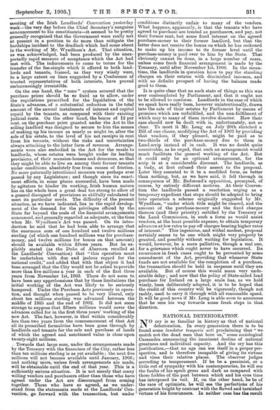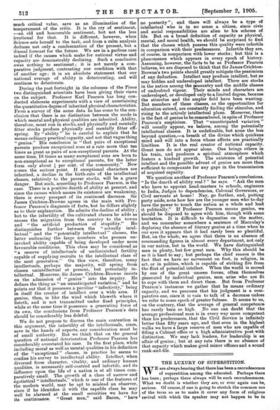NATIONAL DETERIORATION.
NO cry is so familiar in history as that of national deterioration. In every generation there is to be found, some laudator temporis cr,cti proclaiming that "we match not the dead men that bore us," some sociological Cassandra announcing the imminent decline of national greatness and individual capacity. And the cry has this justification,—that no age can see itself in a proper per- spective, and is therefore incapable of giving its virtues and vices their relative places. The observer judges according to temperament. If he be a pessimist, or a little out of sympathy with his contemporaries, he will see the faults of his epoch gross and dark as compared. with those foibles of the past between which and. his eyes time has interposed its veil. If, on the other hand, he be of the race of optimists, he will see the perfections of his generation bright by contrast with the flawed and tarnished virtues of his forerunners. In neither case has the result much critical value, save as an illumination of the temperament of the critic. It is the cry of sentiment, —an old and honourable sentiment, but not the less irrational for that. It is different, however, when Science sets herself to the task, and from a calm analysis deduces not only a condemnation of the present, but a 'dismal forecast for the future. We are in a parlous case indeed if the causes which make for national virtue and capacity are demonstrably declining. Such a conclusion owes nothing to sentiment ; it is not merely a com- parative judgment, contrasting our condition with that of another age ; it is an absolute statement that our national average of ability is deteriorating, and will continue to deteriorate.
During the past fortnight in the columns of the Times two distinguished scientists have been giving their views on the subject. Professor Karl Pearson has long con- ducted elaborate experiments with a view of ascertaining the quantitative degree of inherited physical characteristics. Prom a survey of the same data he has come to the con- clusion that there is no distinction between the mode in which mental and physical qualities are inherited. Ability, therefore, must run in stocks, and physically and mentally fitter stocks produce physically and mentally fitter off- spring. By " ability " he is careful to explain that he means ordinary practical capacity, and not that vague thing "genius." His conclusion is "that pairs of exceptional parents produce exceptional sons at a rate more that ten times as great as pairs of non-exceptional parents. At the same time, 18 times as many exceptional sons are born to non-exceptional as to exceptional parents, for the latter form only about per cent. of the community." Now comes the serious point. If exceptional characters are inherited, a decline in the birth-rate of the intellectual classes, relatively to the poorer stocks, will be a grave danger. But such, according to Professor Pearson, is the case. There is a positive dearth of ability at present, and since the causes which assure its existence are weakening, there is every prospect of its continued decrease. Sir James Crichton-Browne agrees in the main with Pro- fessor Pearson's diagnosis of facts, but he differs slightly as to their explanation. He admits the decline of ability ; but to the infertility of the cultivated classes he adds as causes the migration from the country to the towns and "the artificial production of stupidity." He distinguishes further between the "actually intel- lectual" and the "potentially intellectual" classes, the latter embracing the large numbers who possess un- invoked ability capable of being developed under more favourable conditions. This class may be considered as "a reserve of intellectuals of undiminished fertility ' capable of supplying recruits to the intellectual class of the next generation." On this view, therefore, many intellectuals, perhaps the majority, will spring from classes unintellectual at present, but potentially in- tellectual. Moreover, Sir James Crichton-Browne insists on the admission of " genius " into the inquiry. He defines the thing as "an unanticipated variation," and he points out that it possesses a peculiar "infectivity," being in itself the creator of intellect over a wide area. If genius, then, is like the wind which bloweth where it listeth, and is not transmitted under fixed principles, while at the same time it possesses a generating force of its own, the conclusions from Professor Pearson's data should be considerably less doleful.
. We do not propose to discuss the main contention in this argument, the infertility of the intellectuals, since, save in the hands of experts, any consideration must be of small authority. But we think that on the general question of national deterioration Professor Pearson has considerably overstated his case. In the first place, while including moral as well as mental qualities in his definition of the " exceptional " classes, in practice he seems to confine his survey to intellectual ability. Intellect, when divorced from character, vitality, and ordinary human qualities, is necessarily self-centred and infertile, and its influence upon the life of a nation is at all times com- paratively small. The growth of a class of narrow and. egotistical "intellectuals," which is one of the features of the modern world, may be apt to mislead an observer, since if he identifies it with the capable class he may well be alarmed at the small securities we have for its continuance. "Great men," said Bacon, "have no posterity " ; and there will always be a type of intellectual who is in no sense a, citizen, since civic and social responsibilities are alien to his scheme of life. But on a broad definition of capacity as physical, mental, and moral health, we should be surprised to find that the classes which possess this quality were infertile in comparison with their predecessors. Infertile they are, of course, in comparison with lower stocks ; but this is a phenomenon which appears in every epoch of history. Assuming, however, the facts to be as Professor Pearson believes, we are disposed to think that Sir James Crichton- Browne's two points should greatly mitigate the pessimism of any deduction. Intellect may produce intellect, but so may hidden and undeveloped intellect. There are stocks in the nation among the peasantry and the middle classes of undoubted vigour. Their minds and characters are undeveloped, or developed only to a limited degree, because the stimulus and the ampler field have been wanting. But members of these classes, as the opportunities for education extend, are constantly finding the stimulus, and rising to the actively intellectual plane. Moreover, there is the fact of genius to be remembered, in spite of Professor Pearson's scepticism. That "unanticipated variation" will usually appear, we believe, among the potentially intellectual classes. It is undefinable, but none the less beyond question,—a breath of the divine which quickens mind and will into a force whose effects are practically limitless. It is the real creator of national capacity.
Great men do not appear alone. One brings others in his train, and produces a spiritual atmosphere which fosters a kindred growth. The existence of potential intellect and the possible advent of genius are more than sufficient to compensate for any gaps in the transmission of acquired capacity.
We question another of Professor Pearson's conclusions. "Is the dearth of ability real ? " he says. "Ask the men who have to appoint head-masters to schools, engineers to India, Judges to dependencies, Colonial Governors, or Civil servants at home ! Nay, go further, and, putting party aside, note how few are the younger men who to-day have the power to touch the nation as a whole and lead it politically." If Professor Pearson means genius, we should. be disposed to agree with him, though with some hesitation. It is difficult to dogmatise on the matter, and we remember somewhere a sentence of Macaulay's deploring the absence of literary genius at a time when to our eyes it appears that it had rarely been so plentiful. But, on the whole, we agree that there is an absence of commanding figures in almost every department, not only in our nation, but in the world. We have distinguished men in plenty, but few great men. Why this should be so it is hard to say ; but perhaps the chief reason is the fact that we have no movement on foot, in religion, in art, or in politics, which is capable of striking fire from the flint of potential intellect. When the world is moved by one of the great unseen forces, often themselves generated by individual genius, men arise who are fit to cope with them and direct them. But from Professor Pearson's instances we gather that he means ordinary capacity, and we presume that his judgment is a com- parative one, since it is vain to talk of a decrease unless we refer to some epoch of greater fulness. It seems to us, on the contrary, that the average of general competence has rarely been so high. No one can doubt that the average professional man is in every way more competent than his predecessors, that the Civil Service is infinitely better than fifty years ago, and that even in the highest walks we have a large reserve of men who are capable of filling a Cabinet office or a high administrative post with distinction. We may lack leaders, for leadership is an affair of genius ; but at any rate there is no absence of that capacity which makes good minor officers and a sound rank-and-file.



































 Previous page
Previous page